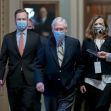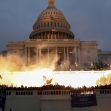There can be little question as to what the main event of the Conservative Political Action Conference (CPAC) was this year. As the climax of the fourth and final day of the meeting, former President Donald Trump took the stage and spoke for well over an hour to an adoring audience of 1,400 in the ballroom of the Hyatt Regency in Orlando, FL.
A very large portion of the speech was devoted to criticism of the Biden presidency, about which the former president didn’t mince words: “Joe Biden has had the most disastrous first month of any president in history,” Trump said. He then targeted his successor’s policies on immigration by stating that “the Biden administration has put the vile coyotes back in business” and that “Biden’s radical immigration policies aren’t just illegal, they’re immoral.”
The first big applause Trump received was when he brought up the question of ongoing school closures: “Joe Biden sold out America’s children to the teachers’ unions.” Taking aim at another of Biden’s first-day executive orders, Trump claimed that his successor “has destroyed women’s sports.” He explained: “young girls and women are incensed that they are being forced to compete against biological males,” adding (to one of several standing ovations he received during the speech) “we must protect the integrity of women’s sports.” To that he added, “is that controversial? You haven’t heard anything yet.”
What followed was a discussion of the Republican party’s role in America, his role in the Republican party, and, one suspects at rather too great a length for even some of his most ardent supporters, a return to the theme that the 2020 election was somehow stolen.
Trump was more interesting talking about the Republican party’s future. To another standing ovation (and chants of “USA”), he stated somewhat surprisingly that the Republican party “is becoming a party of love.” He explained that by comparing the Republicans to the Democrats: “their party is based upon unvarnished disdain for America; our party is based on love for America and the belief that this is an exceptional nation blessed by God.” When he added “we respect our great American flag,” he was greeted by delirious applause and chants of “we love you!”
Speaking to some of the perceived menaces from the left, he explained that his “party of love” was “strongly opposed to radical indoctrination of America’s youth” and instead was committed to “upholding the Judeo-Christian values of our founding. We stand up to political correctness, we stand up to left-wing lunacy and in particular we reject cancel culture. We affirm that the Constitution means exactly what it says as written.”
He rained opprobrium upon the Republicans who showed their opposition to him. The mention of Mitt Romney brought boos from the crowd, something that was repeated whenever he mentioned Liz Cheney (“so hopefully they’ll get rid of her in the next election.”) Then he said that “now more than ever is the time for strong and energetic Republican leaders who have spines of steel” who will “stand up to the radicals who want to turn America into a socialist country.”
To that end, he said that he was “announcing that I will be actively working to elect strong, tough and smart republican leaders” (chants of “USA”), and that “we will go on to victory, we will persist and we will prevail. We’re tougher than they are; we’re stronger than they are.” To that end: “with your help we will take back the House, we will win back the Senate…and then a Republican president will make a triumphant return to the White House, and I wonder who that will be. Who who will that be, I wonder?”
The speech – and not only because of the way it ended – left the former president’s listeners in no doubt as to who was the head of the Republican party. The event was weighted in his favor, of course, but Trump nonetheless seized his opportunity.
The Republicans have been a fractious lot of late, not least of all because of the waste of political capital resulting from Trump’s ongoing insistence that he won the 2020 election. That, followed by the January 6 riot at the Capitol, led to what can best be described as a number of politicians worried about reelection deserting the proverbial sinking ship.
The actions of the likes of Romney and Cheney gave birth to talk of turncoats and RINOs (Republicans In Name Only, which pretty much means any Republican who disagrees with Trump.) The speech, however, did nothing to preach appeasement of these more moderate forces: the former president’s stance was that anyone who disagrees with his Make America Great Again agenda doesn’t belong in the Republican party and that it’s the Trump wing that will retake Congress in 2022 and the White House in 2024.
“Democrats are...smart and they…always stick together, Trump said. “You don’t have Mitt Romneys in the group,” That was his way of preaching unity. The game plan is to sway the moderates toward the Trump agenda, even though he must know in his heart of hearts that courting moderates is going to be the key to retaking the presidency, and that means moderate Democrats as well as Republicans. That was perhaps the mistake he made in 2020, when Americans were confronted with two radical agendas, despite the fact that the average man in the street was probably a moderate.
But Trump shows no signs of budging, even as he made it clear that the reins of the party are firmly in his hands. As a result of the speech, there can be no doubt that the 2024 presidential nomination is his for the taking. Grover Cleveland lost his incumbent bid for the office and won again four years later. So stranger things have happened.






